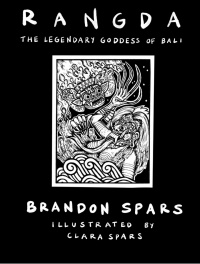Difference between revisions of "Book Rangda: The Legendary Goddess of Bali"
(Created page with "{{PageSponsor}} {{Book |Name of Book=Rangda: The Legendary Goddess of Bali |Original text of book=English |Photograph=Screenshot 20200813-090752 Facebook.jpg |Publisher=Wayzgo...") |
|||
| Line 1: | Line 1: | ||
| − | {{PageSponsor}} | + | {{PageSponsor |
| + | |sponsor_enabled=No | ||
| + | }} | ||
{{Book | {{Book | ||
|Name of Book=Rangda: The Legendary Goddess of Bali | |Name of Book=Rangda: The Legendary Goddess of Bali | ||
| Line 14: | Line 16: | ||
|Author=Brandon Spars, | |Author=Brandon Spars, | ||
|Subject=religion, culture, | |Subject=religion, culture, | ||
| + | |Illustrator=Clara Spars, | ||
|Linked words=Rangda, | |Linked words=Rangda, | ||
}} | }} | ||
Revision as of 14:02, 18 August 2020
- Title
- Rangda: The Legendary Goddess of Bali
- Original language
- English
- Author(s)
- Illustrator(s)
- Clara Spars
- Publisher
- Wayzgoose Press
- ISBN
- ASIN B08FPVQF2M
- Publication date
- 2020
- Subjects
- religion
- culture
- Find Book
- Amazon Kindle
- Related Env. Initiatives
- Related Places
- Related Biographies
- Related Children's Books
- Related Holidays
- Related Folktales
- Related Comics
- Related Lontar
- Linked words
Description(s)
Rangda: The Legendary Goddess of Bali examines the layered origins of this premier Southeast Asian goddess. As revered as Pele of the Polynesian Islands, Rangda is perhaps the most familiar, most feared, and most revered deity, regularly represented by her unique and horrifying mask in the temples of Bali while also adorning the tourist pamphlets and t-shirts of Kuta Beach. Even though prominent, she has been both misunderstood and misrepresented. This book delves into her textual origins in the lontar tradition (palm leaf manuscripts) and combines that with a close look at her crucial role in Balinese cleansing rituals before arriving at how modern Indonesian writers are trying to free this goddess from her imprisonment by state and patriarchal powers. In an illustrated section, the author and illustrator (Clara Spars) combine their talents to portray Rangda’s power to captivate and enchant today and through the ages.



Enable comment auto-refresher